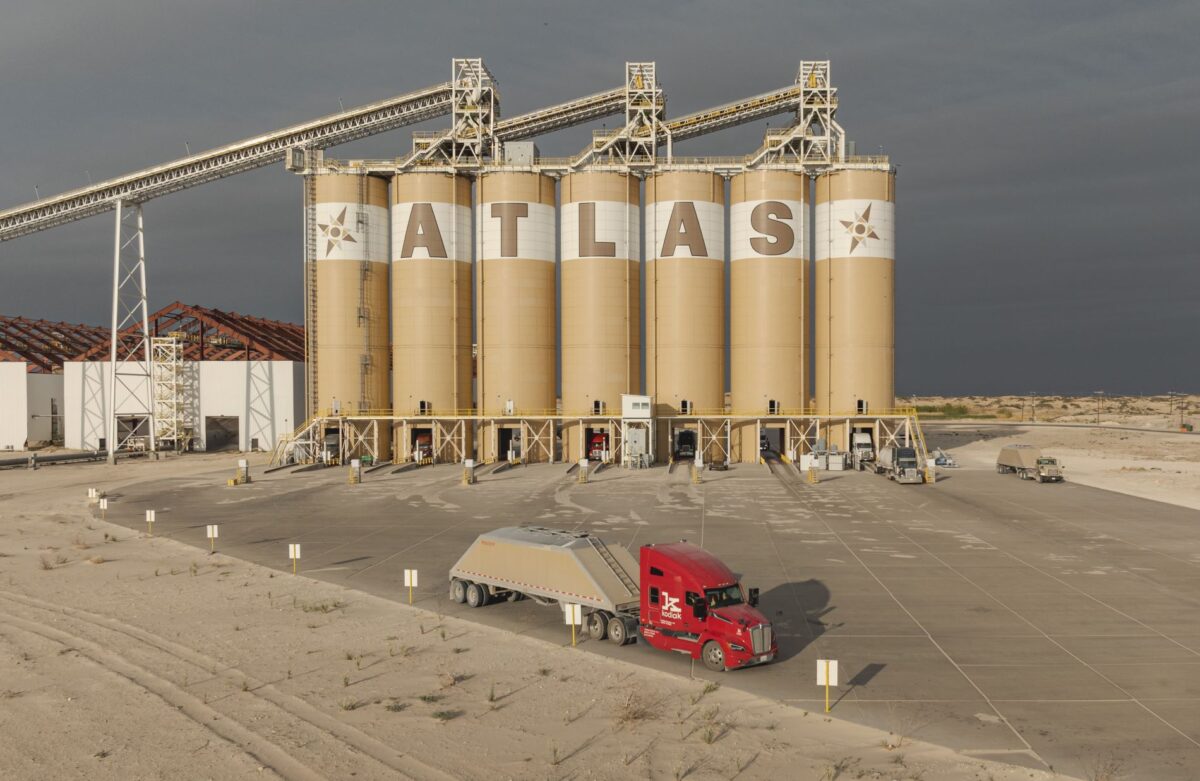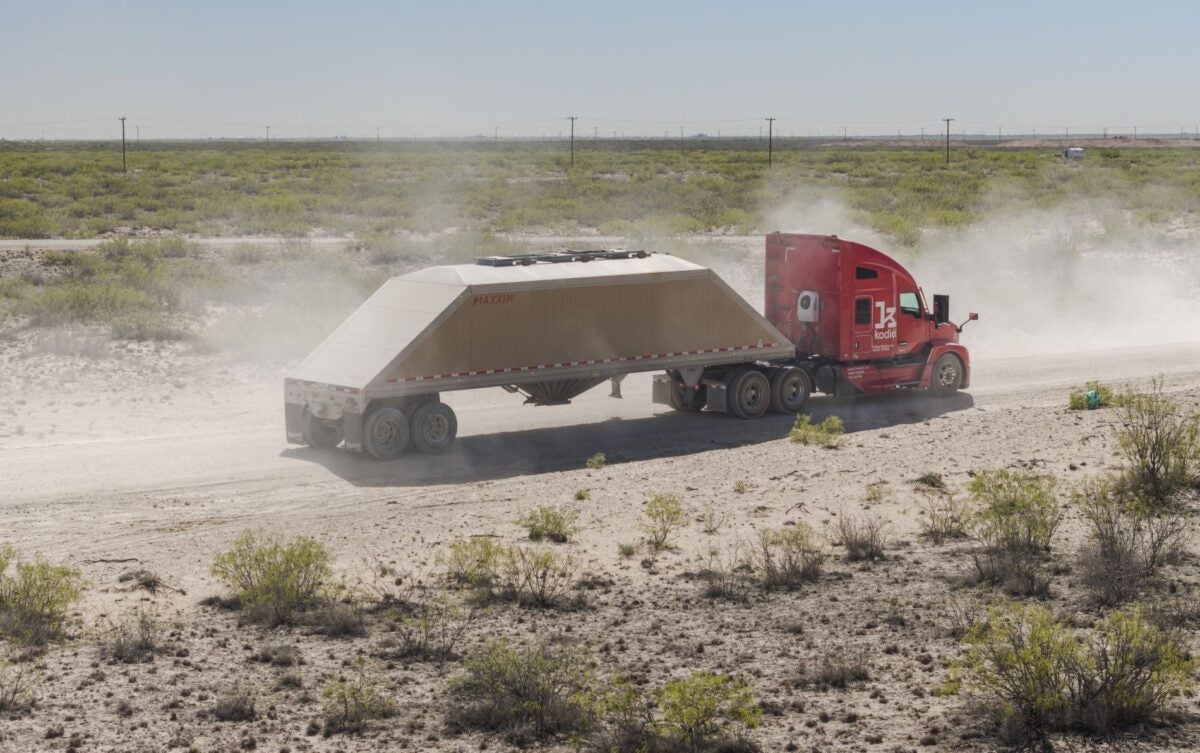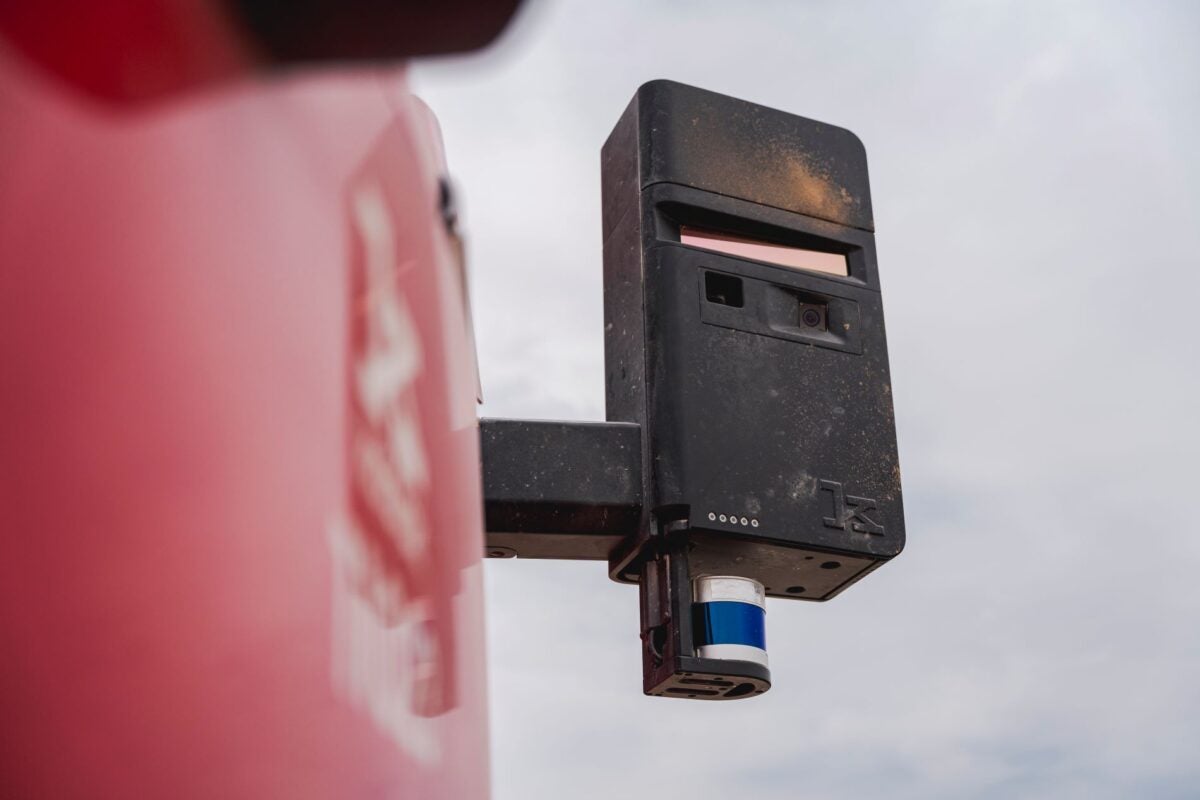If bragging rights matter, Kodiak Robotics gets them for the first-known driverless commercial freight delivery. But the feat achieved in early May was not what many had expected: a 53-foot dry van of consumer goods rolling 65 mph on a Texas interstate. Instead the autonomous trucking developer pivoted, moving fracking sand used in oil drilling at about 15 miles an hour over 21 miles of sandy dirt roads in the oil fields of the West Texas Permian Basin.

Why the move?
“The AV industry as a whole needs a path to profitability. We need paths to revenue, we need paths to deployment, we need to do it safely and we need to do it responsibly,” Kodiak CEO Don Burnette told me on Tuesday.
Atlas Energy Solutions is purchasing two Class 8 trucks that Kodiak’s so far unnamed upfitter will equip with the Kodiak Driver hardware and software that require no human driver.
As it works out the kinks of off-road operation toward delivering dozens or scores of autonomous systems to Atlas next year, Kodiak is using its fleet of Kenworth T680s – intended for over-the-road use – to fulfill a driver-as-a-service arrangement with Atlas. The routes are too short for a more traditional per-mile fee to be meaningful.
Atlas will own and operate the Kodiak Driver-equipped trucks. Kodiak will make sure they get to their destination on time and will monitor their performance.

The heavy-duty vocational trucks will come from a manufacturer Kodiak declined to name. Kenworth’s parent Paccar leads the vocational market. Volvo Group’s Mack Trucks, Daimler Trucks’ Western Star and Navistar also compete.
Putting points on the board
Kodiak is a leader in autonomous truck development. But it is unique because it has no specific OEM partner developing a redundant chassis with backup steering, braking and compute power. Kodiak does all those things with Tier 1 suppliers.
Exclusivity agreements might delay Kodiak’s access to such a purpose-built chassis, but OEMs likely would make them available to all autonomous industry players at some point.
Aurora Innovation, which has non-exclusive chassis development partnerships with Volvo and Paccar, demonstrated its driverless functions for analysts and media in March at a closed course in Pittsburgh with speeds governed to 35 mph. It is on track to start driverless operations on 20 upfit trucks hauling freight between its purpose-built autonomous depots near Dallas and Houston by the end of the year.
Torc Robotics, an independent subsidiary of Daimler Truck, targets 2027 for full commercialization. It runs 1,000-mile routes from Phoenix to Oklahoma City for Schneider and C.R. England with safety drivers monitoring robotic operations.
Pilot helping with Kodiak strategy
Kodiak needs proof points like the Atlas deal to shake money free from investors who largely moved to the sidelines after the SPAC frenzy earlier in the decade. That’s when many young companies agreed to merge with shell companies seeking to invest in promising technologies they sometimes didn’t understand.
“A lot of growth-stage investors have been scared off in the self-driving space,” Burnette said. “They want to see a reliable path, they want to see deployment and they want to see value creation. Those are all things this contract and this relationship with Atlas offers.”
Kodiak deliberately avoided merging with a special purpose acquisition company. It has not announced new funding since a $125 million raise led by Pilot Co. in November 2021. Kodiak and Pilot opened an autonomous-enabled truckport in Villa Rica, Georgia in August.
Pilot, which operates a large fleet in the Permian Basin to move petroleum products for its hundreds of filling stations, has a seat on Kodiak’s board and helped strategize the company’s off-road emphasis. It’s unclear when or if Pilot would convert any of its fleet to run on the Kodiak Driver.
Show me the money
Burnette said more money for Kodiak is coming. But he won’t say when.
“Investors are really excited about the partnership with Atlas, the driverless deployment and the path to revenue,” he said.
Aurora, by contrast, raised more than $850 million in 2023. It says it will need even more money to reach commercial scale by 2027. AI-focused newcomer Waabi recently raised $200 million. Stack AV, a startup founded by the deeply experienced founders of failed autonomous car startup Argo AI, is backed by Japan’s Softbank Group. But Stack has shared little about its plans. Torc has Daimler resources, so it doesn’t need to access the public markets.
Driving in the desert
Kodiak’s pivot to the oil patch makes sense because in addition to on-highway, Level 4 autonomy, it works on military projects, including the conversion of a Ford F-150 light-duty pickup truck to run its autonomous system. The military development work has been worth $50 million to Kodiak so far.
“The whole genesis of us going into this space was inspired … by working off-road with the military,” Burnette said. “It exceeded our own expectations of what was possible in the commercial space.”

Kodiak’s sparse mapping approach to autonomy contrasts with others who develop and refresh high-definition maps of their routes.
“This environment is not conducive to HD mapping-like approaches,” he said. “It’s completely unstructured. The sand is moving around constantly. The roads shift literally by the hour.” That requires a more rugged system like the one Kodiak designed for the military.
Pushing out highway deployment
Kodiak had indicated driverless readiness by the end of the year. It never specifically said it would be on I-45, where it has been hauling customer freight with safety drivers around the clock for several years.
All indications pointed to on-highway freight. Startup freight broker Loadsmith said in June 2023 it planned to buy 800 autonomous driving systems from Kodiak by the second half of 2025. Another unidentified trucking company also has nonbinding reservations with Kodiak.
“We’re not going to deliver that commercial over-the-road product to our customers in 2024,” Burnette said. ”Given the focus we’ve placed on ramping up Atlas, we see this as our core first step toward a driverless deployment. Once we start to scale that business, we will then turn our focus to delivering over-the-road trucks.
Paccar stock takes huge hit following Q2 earnings
“What have I, what have I, what have I done to deserve this?” – Dusty Springfield and the Pet Shop Boys
You couldn’t blame denizens of the C-suite at Paccar Inc. for muttering the refrain from the 1980s alternative rock song – if they even knew of it – after Tuesday’s earnings day smackdown by investors in the parent of Kenworth, Peterbilt and DAF Trucks.
Analysts predicted the Bellevue, Washington-based commercial truck manufacturer would earn $2.14 per share on $8.3 billion in sales. Paccar handily beat the sales figure by $550 million, reporting $8.8 billion in revenue. But for the first time in more than a year, it failed to exceed estimated earnings – missing by a penny at $2.13.
Overheated stock price
Paccar’s stock price has been overheated for months. Its 52-week high is $125.50. That came after a 3:2 split executed in February 2023 that reset the share price in the high $60s.
At Tuesday’s closing bell, Paccar (NASDAQ: PCAR) was down 10.97% at $97.10. A day earlier, shares closed at $109.06. They closed Thursday at $97.60.
Maybe a hit was inevitable. But more than 10% in a single day? That’s practically unheard of among established OEMs like Paccar, absent a cataclysmic event.
In addition to the tiny earnings miss, Paccar painted a more negative view of industry sales for the rest of 2024 – a projected fall of 15% in the U.S. and Canada from about 305,000 trucks in 2023 to roughly 260,000 in 2024. Other OEMs see the market similarly. The issue is almost exclusively falling sales to truckload fleets, where weak spot and contract freight rates persist.
Paccar’s Kenworth plant in Chillicothe, Ohio, told employees Thursday it is laying off hundreds of workers. That came despite Paccar reporting overall market share of 31.5% compared to 27.7% a year ago. Its profit margin on parts sales – a cash cow since the depths of the pandemic – remained above 30%. Overall margins hovered around 18%.
Briefly noted …
The Nasdaq reset the clock for fuel cell manufacturer Hyzon to get its stock price above $1, granting an additional 180 days.
Range Energy is partnering with the air pollution agency in Southern California to build and demonstrate its electric-powered trailers for the Class 8 truck market.
Convicted Nikola founder Trevor Milton dropped his billion-dollar lawsuit against the electric truck maker and its chief legal officer after Nikola threatened to oppose him in court.
Truck Tech Episode No. 75: Startup Verne expects to challenge diesel with super cold hydrogen storage technology
The Future of Freight Festival is coming in November. Get your tickets today with this discount offer.
Also, nominations for the FreightTech 25 are open until Sept. 6. Winners will be announced at F3.
That’s it for this week. Thanks for reading and watching. Send your feedback on Truck Tech to Alan Adler at aadler@firecrown.com. Click here to subscribe and get Truck Tech delivered to your email on Fridays. And catch the latest episodes of the Truck Tech podcast and video shorts on the FreightWaves YouTube channel.







